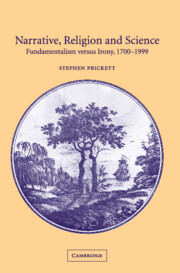Book contents
- Frontmatter
- Contents
- Acknowledgements
- Introduction: Arthur Dent, Screwtape and the mysteries of story-telling
- 1 Postmodernism, grand narratives and just-so stories
- 2 Newton and Kissinger: Science as irony?
- 3 Learning to say ‘I’: Literature and subjectivity
- 4 Reconstructing religion: Fragmentation, typology and symbolism
- 5 The ache in the missing limb: Language, truth and presence
- 6 Twentieth-century fundamentalisms: Theology, truth and irony
- 7 Science and religion: Language, metaphor and consilience
- Concluding conversational postscript: The tomb of Napoleon
- Bibliography
- Index
4 - Reconstructing religion: Fragmentation, typology and symbolism
Published online by Cambridge University Press: 12 November 2009
- Frontmatter
- Contents
- Acknowledgements
- Introduction: Arthur Dent, Screwtape and the mysteries of story-telling
- 1 Postmodernism, grand narratives and just-so stories
- 2 Newton and Kissinger: Science as irony?
- 3 Learning to say ‘I’: Literature and subjectivity
- 4 Reconstructing religion: Fragmentation, typology and symbolism
- 5 The ache in the missing limb: Language, truth and presence
- 6 Twentieth-century fundamentalisms: Theology, truth and irony
- 7 Science and religion: Language, metaphor and consilience
- Concluding conversational postscript: The tomb of Napoleon
- Bibliography
- Index
Summary
FROM RELIGION TO RELIGIONS
Christianity was the original grand narrative. Unlike either Judaism, or the various pagan cults it had supplanted in the late Roman world, for more than 1,000 years it seemed to many of its adherents to offer the final and coherent Theory of Everything. This fundamental consilience (to use E.O. Wilson's re-coined word) included not merely the dramatic sweep of the Bible narrative itself, beginning with the Creation and ending with the Apocalypse, but cosmology, botany, zoology and even secular literature, integrated into a single vast all-encompassing system. In its most developed form not merely human society, but animals, plants, minerals, and even angels themselves, were arranged in a divinely ordered Great Chain of Being whose golden links reached from the throne of God to the lowliest inanimate parts of Creation. The earth-centred Ptolemaic universe, the providential powers of medicinal herbs, and the hierarchies of mediaeval bestiaries, all bore witness to the divine scheme of the universe. The very completeness of the narrative by the late middle ages made the idea of an alternative story almost unthinkable.
Even the one apparent cultural exception to this order, the literature of classical antiquity, was ingeniously incorporated into this great universal narrative. As early as the first century, Philo, a Hellenized Jew, claimed that the Greek philosophers such as Plato were not merely compatible with the Hebrew scriptures, but had actually been influenced by them.
- Type
- Chapter
- Information
- Narrative, Religion and ScienceFundamentalism versus Irony, 1700–1999, pp. 128 - 156Publisher: Cambridge University PressPrint publication year: 2002



